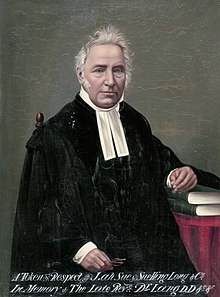John Dunmore Lang | |
|---|---|
 Posthumous portrait of Lang, circa 1888. | |
| Member of the New South Wales Legislative Assembly for West Sydney | |
| In office 14 June 1859 – 15 November 1869 | |
| Preceded by | Electorate established |
| Succeeded by | William Speer |
| Member of the New South Wales Legislative Council | |
| In office 1 August 1854 – 29 February 1856 | |
| Preceded by | Arthur Hodgson |
| Succeeded by | Electorate abolished |
| Constituency | County of Stanley |
| In office 1 July 1850 – 1 October 1851 | |
| Preceded by | William Bland |
| Succeeded by | Robert Campbell |
| Constituency | City of Sydney |
| In office 1 June 1843 – 1 November 1847 | |
| Preceded by | Electorate established |
| Succeeded by | John Airey |
| Constituency | Port Phillip |
| Personal details | |
| Born | 25 August 1799 Greenock, Inverclyde, Scotland |
| Died | 8 August 1878 (aged 78) Sydney, Colony of New South Wales |
| Resting place | Scots Church, Sydney |
| Citizenship | |
| Spouse |
Wilhelmina Mackie (m. 1831) |
| Children | 10 |
| Alma mater | University of Glasgow |
| Occupation |
|

John Dunmore Lang (25 August 1799 – 8 August 1878)[1][2] was a Scottish-born Australian Presbyterian minister, writer, historian, politician and activist. He was the first prominent advocate of an independent Australian nation and of Australian republicanism.
- ^ Cite error: The named reference
NSW Parl Langwas invoked but never defined (see the help page). - ^ Baker, D. W. A. (1967). "Lang, John Dunmore (1799–1878)". Australian Dictionary of Biography. Canberra: National Centre of Biography, Australian National University. ISBN 978-0-522-84459-7. ISSN 1833-7538. OCLC 70677943. Retrieved 5 September 2014.
